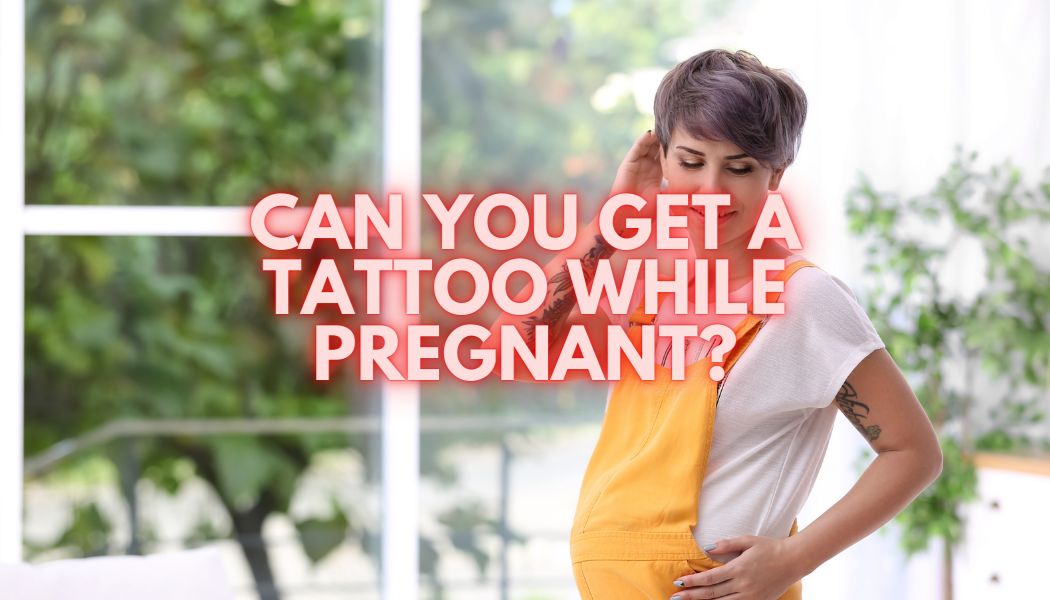- Ink Different Tattoo School
- 1-917-227-2842
- info@tattooschool.com
Can You Get a Tattoo while Pregnant?
Body Art and Baby: Understanding Tattoo Safety During Pregnancy
Getting a tattoo under normal circumstances comes with many considerations. This becomes especially true when a pregnancy is involved. The idea of possibly getting a tattoo to commemorate such an important point in your life might seem exciting. But there are a lot of factors and potential risks to take into account if you’re pregnant. Safety should ALWAYS be your number one priority.
If you are asking yourself “Can you get a tattoo while pregnant?”. The information below can hopefully make you aware and knowledgeable enough of all the risks. It will eventually help you make the safest decision for yourself and your baby.
Can I get a tattoo while pregnant?
Technically, yes. If someone who is pregnant decides they want to get a tattoo, they can as long as the tattoo shop allows it. There is no official law against getting a tattoo while pregnant. The question to consider is whether it is safe and/or a good idea to get tattoos during pregnancy. Unfortunately, there has not been extensive research done to definitively say whether getting a tattoo while pregnant is or is not safe. That being said, the consensus across the tattoo and medical community is that it is NOT safe and, thus, NOT recommended.
The same risks that are normally associated with getting a tattoo exist if you decide to get a tattoo while pregnant except those risks now extend to the fetus, as well.
What are the risks of getting a tattoo during pregnancy?
Viral Infection from Inadequate Hygiene Practices
First of all, the main danger of getting a tattoo during pregnancy is the risk of contracting a bloodborne disease, such as Hepatitis B, Hepatitis C, or HIV.
If the tattoo artist and/or the tattoo shop do not practice proper hygiene procedures, there is a chance of viral infection and contracting something like Hepatitis B. If this occurs while you’re pregnant, the infection could be passed on to the fetus. Thus, causing potentially severe complications to your pregnancy.
Because of the danger of infection alone, it is recommended that you wait to get a tattoo until after your baby is born.
Bacterial Infection
Risk of infection is always possible when getting tattooed, pregnant or not. Some people may have a negative reaction when they get a tattoo. This could cause a bacterial infection. It manifests in the form of fever, chills, sweats, or shaking. The tattoo area itself could see swelling and redness, crusting, drainage of pus, and increased pain.
If you’re pregnant, the infection alone could cause complications. But the danger to the fetus comes particularly in how the bacterial infection is treated. Medications like antibiotics that would be used to treat the infection could negatively affect the fetus and cause further complications to your pregnancy.
Skin Reactions from Tattoo Inks
Similarly, a person’s skin can sometimes have a negative reaction to the dye in the tattoo inks used by the tattoo artist. The dyes in tattoo inks contain minerals. Different colors will have different minerals. There is always a chance that a person’s skin will have a bad reaction to some of these minerals. And because the tattoo needle is depositing this ink under your top layer of skin. The negative reaction could last for an extended period of time.
Again, a particular risk comes with this occurring to pregnant women because of the medication they might need to take to clear up the negative reaction. Corticosteroids will usually be prescribed to relieve these kinds of reactions but these may not be safe if taken while pregnant.
Other Reasons To Consider Waiting Until After Childbirth
Stress and Pain Threshold
Pregnancy can change a woman’s body in many different ways. Some ways are more severe than others. During pregnancy, a woman’s skin becomes more sensitive. With heightened skin sensitivity comes a heightened amount of pain. So you can imagine what that would mean if you decided to get a tattoo while pregnant. The amount of pain you would feel would be much higher especially if the tattoo is done on a part of the body that already is known to be more painful.
The increased sensitivity to pain can also result in stress on your body. It’s worth mentioning that stress, no matter where it comes from, can be a significant factor in causing complications in a pregnancy. Getting a tattoo can create many reasons for increased stress whether it be from increased pain, a viral or bacterial infection, or any kind of negative reaction. So if you’re considering getting a tattoo while pregnant, you should seriously reconsider it, the risk is too great.
Is it safe to get a new tattoo while still breastfeeding?
It’s logical to think that once you’ve given birth it’s safe to get a tattoo since the pregnancy is over. This could be true except in the case where you are breastfeeding your baby. The act of breastfeeding a baby is still a physical connection between a mother and child.
One that is still susceptible to the same risks from getting a tattoo that we have stated above. If you were to contract a viral infection. The disease could be transmitted to the baby through your breast milk. If you experience a bacterial infection or a severe skin reaction.
The medication you would possibly take to remedy that could affect the baby via breastmilk. An infection resulting from toxic minerals that exist in certain inks could be introduced into your baby’s system through breast milk, as well.
So while it may seem like you have the green light to get tattooed again once your baby is born, you may want to consider first if you will be breastfeeding your baby. If the answer is yes, then it is generally recommended to wait until you are no longer breastfeeding to begin getting inked again.
Tattoo
Quality
Another possible problem is a different kind of reaction to tattoo ink. Pregnancy hormones can change the body’s reaction to many things. This includes tattoo inks and cosmetics. Aside from the negative skin reactions that we’ve already mentioned what could occur is that the body can react in such a way that the tattoo may come out blurred or faded ruining the tattoo that you’ve already put yourself and your pregnancy at risk for.
Did you know our tattoo school, Ink Different, has locations in several vibrant cities across the United States? We do! We have locations in Brooklyn, Los Angeles, Chicago, Tampa, Miami, Philadelphia, and Connecticut.
What if you’re pregnant and already have tattoos?
How Tattoos Can Be Affected By Pregnancy
It’s an equally fair question to ask what happens to the tattoos you already have once you’re pregnant? As you can imagine the obvious answer has to do with how and where the skin changes and stretches during pregnancy.
Tattoos on the stomach hips or lower back are more susceptible to changes due to your skin stretching than tattoos on shoulders or arms. Stretch marks usually appear on those parts of the body during pregnancy. What you can do from the beginning of your pregnancy is use natural oils and creams to help prevent those inevitable stretch marks. Shea butter or argan oil could help your skin stay in good condition throughout your pregnancy. After the baby is born it’s important to continue to take care of your skin, especially around the belly.
If you already have tattoos, then you know that inked skin should be more carefully protected from UV rays. Mothers also know that a pregnant woman’s skin can experience discoloration more often, as well. So some more advice for tattooed moms would be to use skin creams with a high SPF.
Epidurals
A common question that often comes up for pregnant women with tattoos. You can get an epidural if you have a lower back tattoo. There are a lot of unconfirmed rumors and speculation. You will be refused an epidural if you have a lower back tattoo. The reality is that experts have determined that an epidural should not be excluded in women with a lower back tattoo. Complications can arise from an epidural administered through a lower back tattoo. But at this point, it seems to be quite rare.
Ultimately, the only real way to address this question is for you to talk to your doctor. Let them know that you have a lower back tattoo. Ask whether or not they foresee an issue if you are planning on receiving an epidural during childbirth.
What about henna tattoos?
Those who still find great personal meaning in getting a tattoo while pregnant might consider getting a henna tattoo as an alternative. In some cultures, it’s even a tradition to get a henna tattoo on their pregnant bellies as an act of good luck. But the question remains the same: is it safe?
The short is yes but there are still potential risks to consider. Henna tattoos are temporary. Henna is also typically all-natural. But that is not always the case. So, if you’re seriously considering getting a henna tattoo while pregnant, you’ll want to be sure of two things. First, you need to be absolutely sure that the artist giving you the henna tattoo is ONLY using all-natural henna and nothing artificial. Second, and possibly most important, you should NEVER use black henna. Black henna does not occur naturally and contains para-phenylenediamine (PPD), which causes burns, blisters, and other reactions that could last for months and could be difficult to diagnose and treat. Black henna can be dangerous to anyone whether you are pregnant or not.
What if I want to get a tattoo anyway?
Ultimately, the choice of whether to get a tattoo while pregnant is up to you. It’s generally agreed upon that it is not recommended to get tattooed while you are pregnant or breastfeeding. You should seek medical advice if you are considering it. There are too many risks that could cause severe complications to your health and your pregnancy. Hopefully, the information we’ve provided will help you make the best decision for you.
Tattoo Apprenticeship at Ink Different
Ink Different Tattoo School prides itself on offering a comprehensive tattoo apprenticeship program that sets aspiring Tattoo Artists on the path to success. Our program is designed to provide hands-on training, guidance, and support to help our apprentices develop their skills and artistic vision. With experienced Tattoo Artists as mentors, apprentices at Ink Different learn the art of tattooing in a creative and inspiring environment.
Enrolling in a tattoo apprenticeship with Ink Different Tattoos can be highly beneficial for aspiring tattoo artists looking to break into this vibrant industry. Ink Different Tattoos is renowned for its commitment to excellence and its dedication to nurturing emerging talent. Under the guidance of experienced artists, apprentices at Ink Different Tattoos can learn not just the technical skills of tattooing but also gain insights into client interactions, design principles, and studio management. This comprehensive training prepares apprentices not only to create beautiful tattoos but also to thrive in the competitive world of tattooing.
Guaranteed Job Offer
One unique aspect of our apprenticeship program is our guaranteed job offer upon successful completion. We are committed to helping our apprentices transition from apprentices to professional Tattoo Artists, and our job offer ensures that they have a place to begin their careers. This commitment sets us apart from other tattoo schools. It reflects our dedication to supporting the next generation of Tattoo Artists.
Diversity and Inclusion
At Ink Different Tattoo School, we understand the importance of diversity and inclusivity in the tattoo industry. That's why we are proud to offer our program in multiple locations across the United States, including Brooklyn, Chicago, Tampa, and Miami-Fort Lauderdale. Our commitment to diversity is also reflected in our staff, many of whom are bilingual and speak Spanish, ensuring that our apprentices feel welcome and supported regardless of their background.




